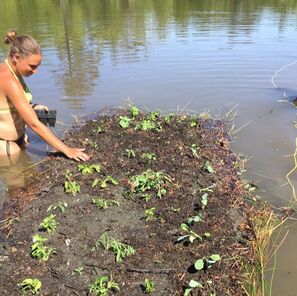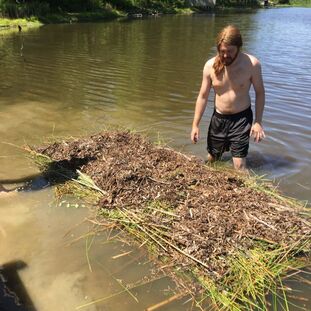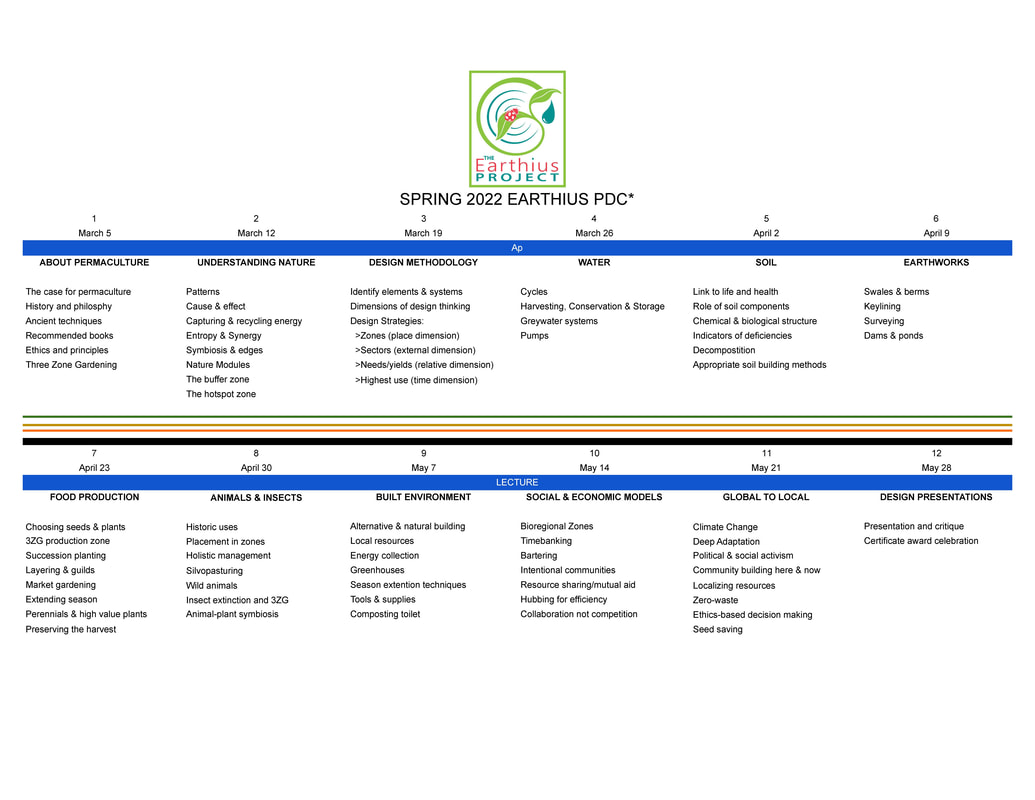They have to do a little ceremony to keep the springs flowing along certain a mountainside. We laugh at them. We know those springs will flow whether they have a ceremony there or not. But if we take their religions away, the springs will stop flowing. You don't talk to idiots about advanced concepts. Anyway, they won't tell us much about what they know. I suppose they would worry about what we would do with the information." ~ Bill Mollison, on Aboriginal wisdom
If you'd like to support The Earthius Project's mission by helping fund the development and platforming of affordable and accessible course material, please visit our Open-Collective page by clicking the button below:
What makes the Earthius PDC so special?
The Earthius Project is actively engaged in community building, ecological rehabilitation and regeneration, food production, water management, alternative social modeling, economic and political activism and much, much more. The Project's original site in Wake Forest, NC, has been named a UN Decade for Biodiversity 2019 Project of Merit in response to our unique application of permaculture and Three Zone Gardening design. This site is now run by the North Carolina Nature School, who continue to expand the offerings and use of the site, based on our regenerative mission.
In 2023, the Project was expanded to Europe, where we have bought a 240 year old mill barn in the Rheinland-Pfalz region of Germany. Built during the American Revolution (!), the mill and its barn were fashioned from brinks made from the local sandstone. This sandstone has been formed throughout the region into "chimneys" and caverns that dot the mountaintops and are connected by hundreds of miles of prestine woodland bike, hike and equestion greenways and paths.
The new project grounds are located in the Rheinland-Pfalz region of Germany, just 2 miles from the border to Alsace-Lorraine, France. Here we will start offering the PDC in English during the Fall of 2024, with plenty of work-trade opportunities to make your European Adventure Dreams a reality!
In 2023, the Project was expanded to Europe, where we have bought a 240 year old mill barn in the Rheinland-Pfalz region of Germany. Built during the American Revolution (!), the mill and its barn were fashioned from brinks made from the local sandstone. This sandstone has been formed throughout the region into "chimneys" and caverns that dot the mountaintops and are connected by hundreds of miles of prestine woodland bike, hike and equestion greenways and paths.
The new project grounds are located in the Rheinland-Pfalz region of Germany, just 2 miles from the border to Alsace-Lorraine, France. Here we will start offering the PDC in English during the Fall of 2024, with plenty of work-trade opportunities to make your European Adventure Dreams a reality!

The founder of Earthius, Adriana, will lead the PDC through a structured program. Adriana has an extensive array of skills and experiences that make for diverse and multifaceted discussions and activities. Her background in teaching economics and publishing research about women in development places her in a unique position to address the global ramifications of the alternative social and economic models that permaculture has to offer. For more information on your instructor, check out her LinkedIn page or click the ABOUT tab in the menu.
The Earthius PDC touches on topics most other PDCs skip, such as Deep Adaptation, Climate Chaos, Activism, Prepping, and so much more. This program will teach you how to design not just landscapes, but also your life. It will show you how to build community and give you one to boot! We will tell it like it is, what we face in the near future, but give you ways to live in compassion, love, and giving now.
How is the PDC structured?
THE FOLLOWING IS THE FORMAT OF THE US-BASED PROGRAM OFFERED IN THE PAST AND MAY NOT BE THE STRUCTURE OF FUTURE COURSES OFFERED IN EUROPE.
Since the standard requirement for contact with your instructor is 72 hours, we have divided the course into 12 sessions of 6 hours each (1 session per weekend).
The format is usually about 3 hours of lecture and 3 hours of hands-on activity or design work.
This does not include the time you may stay after a session to collaborate with teammates, to engage in community, or complete work-trade commitments. Additionally, there will be several field-trips and special guest presenters outside of these session. You will also be assigned a weekly list of tasks to complete at home before the next session, to include readings, videos, research, designing, or writing.
Since the standard requirement for contact with your instructor is 72 hours, we have divided the course into 12 sessions of 6 hours each (1 session per weekend).
The format is usually about 3 hours of lecture and 3 hours of hands-on activity or design work.
This does not include the time you may stay after a session to collaborate with teammates, to engage in community, or complete work-trade commitments. Additionally, there will be several field-trips and special guest presenters outside of these session. You will also be assigned a weekly list of tasks to complete at home before the next session, to include readings, videos, research, designing, or writing.
Please bring your own lunch to eat during the lecture break. We will provide water and iced mint tea, but please bring your own thermos to maintain sanitation and reduce cleanup.
What do our students say?
The Earthius PDC is a fantastic gateway into the world of permaculture... [read more]
I'm so happy and grateful to have been taking it! This class is packed with great information... [read more]
What does it cost?
THIS SECTION WILL BE UPDATED when the new European Program for Fall 2024 has been developed and published. To be the first to find out about dates, costs, registration, please be sure to sign up for the Newsletter.
Reviews
*****FIVE STARS*****
Becky B.
Cedar Grove NC
June 2020
Becky B.
Cedar Grove NC
June 2020
 I jumped into the lake on hot days!
I jumped into the lake on hot days!
The Earthius PDC is a fantastic gateway into the world of permaculture for a complete novice, as well as an interactive space for those with more experience to further develop their skills and knowledge. The PDC is a 12-week course with each class consisting of a comprehensive lecture on a specific aspect of permaculture design (i.e. water, soil, earthworks, food production, animals, etc.) that explores various approaches and techniques including their history, effectiveness in addressing key issues, the logical reasoning behind them, and an emphasis on their ethical implications. Each class also includes a hands-on project that allows students to put into practice the information learned in each lecture, develop a proficiency in using various tools and resources, and gain real experience in designing and constructing new elements such as earthworks or structures. These projects really help you to further grasp closed-loop thinking and it is rewarding to see the very tangible fruits of your labor!
As an instructor Adriana is very encouraging of taking time for discussion and learning from each others' experiences, she is flexible and allows the interests of the students to guide the hands-on projects, and she has a relaxed attitude making each class enjoyable and fun! As a student I feel that all of my questions are appreciated and answered thoroughly, and I leave each class with a buzzing head full of new ideas and inspiration. It is one thing to watch videos and read about permaculture, but it is very different to come together with others who are passionate about it to learn and create together, and this course provides that opportunity.
The course is generously priced for the value it provides and there are work-trade options available to help decrease the cost and provide even more opportunities for real-life experience with permaculture techniques.
Anyone local who is interested in learning how to put into practice the ethics and principles of permaculture design on their land or in their everyday approaches to solving issues in their own lives, their communities, or in the world should consider taking this course!
As an instructor Adriana is very encouraging of taking time for discussion and learning from each others' experiences, she is flexible and allows the interests of the students to guide the hands-on projects, and she has a relaxed attitude making each class enjoyable and fun! As a student I feel that all of my questions are appreciated and answered thoroughly, and I leave each class with a buzzing head full of new ideas and inspiration. It is one thing to watch videos and read about permaculture, but it is very different to come together with others who are passionate about it to learn and create together, and this course provides that opportunity.
The course is generously priced for the value it provides and there are work-trade options available to help decrease the cost and provide even more opportunities for real-life experience with permaculture techniques.
Anyone local who is interested in learning how to put into practice the ethics and principles of permaculture design on their land or in their everyday approaches to solving issues in their own lives, their communities, or in the world should consider taking this course!
*****FIVE STARS*****
Thomas W.
Cedar Grove NC
June 2020
Thomas W.
Cedar Grove NC
June 2020
 We got to build a Chinampa!
We got to build a Chinampa!
The Earthius Permaculture Design Certificate course is great!
I'm currently enrolled in this course and we are nearing the end. I'm so happy and grateful to have been taking it! This class is packed with great information, taught by Adriana in an easy to understand and relevant manner... I'm always so excited to share what I learned with my friends!
I've been taught about a wide variety of permaculture concepts and how to apply them, and it's not just a lecture, we were constantly doing hands-on projects and having open discussions. She also directs us to a variety of resources and gave us many tips and tricks along the way. The course was even oriented towards the interests of the participants... we were curious about floating gardens, so, we made one!
I really enjoyed my time with Adriana as my teacher. She is a fun person and has become my friend.
My favorite take-away from the course is that you can set up your land with self-sustaining systems so that it works for you and you give back to it with minimal maintenance work!
Some highlights for me:
-using structures to invigorate your property's environment and productivity... ponds, dams, groundwater retention methodology, surface water management, sun traps, habitat construction...
-observing and evaluating naturally occurring systems... structure and plants (their species, location, health) and what their clues tell you about the environment, nutrient cycles, water movement...
-using passive and simple technologies... non-electric pumps, contouring tools, swales, wind control, heating and cooling methodology, natural materials and construction...
Thanks Adriana, It's been a blast!
I'm currently enrolled in this course and we are nearing the end. I'm so happy and grateful to have been taking it! This class is packed with great information, taught by Adriana in an easy to understand and relevant manner... I'm always so excited to share what I learned with my friends!
I've been taught about a wide variety of permaculture concepts and how to apply them, and it's not just a lecture, we were constantly doing hands-on projects and having open discussions. She also directs us to a variety of resources and gave us many tips and tricks along the way. The course was even oriented towards the interests of the participants... we were curious about floating gardens, so, we made one!
I really enjoyed my time with Adriana as my teacher. She is a fun person and has become my friend.
My favorite take-away from the course is that you can set up your land with self-sustaining systems so that it works for you and you give back to it with minimal maintenance work!
Some highlights for me:
-using structures to invigorate your property's environment and productivity... ponds, dams, groundwater retention methodology, surface water management, sun traps, habitat construction...
-observing and evaluating naturally occurring systems... structure and plants (their species, location, health) and what their clues tell you about the environment, nutrient cycles, water movement...
-using passive and simple technologies... non-electric pumps, contouring tools, swales, wind control, heating and cooling methodology, natural materials and construction...
Thanks Adriana, It's been a blast!

